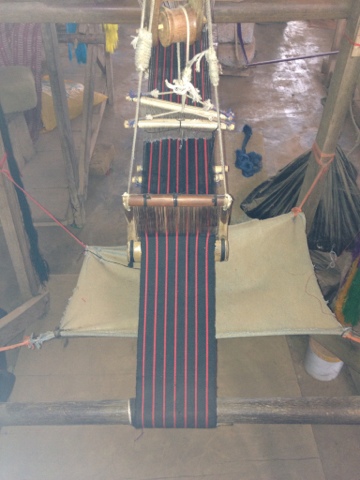This week I spent a great deal of time in Kumasi Central Market, hence, I wanted to give you a peek into the hustle and bustle of this vast place. The market was built in 1936 and since it has continued to grow and grow and grow. It is the largest open-air market in West Africa with over 10,000 stalls and attracts traders from all over Kumasi and surrounding areas. I have had the opportunity to spend the week in the market and, as always, I was mesmerized by its ebb and flow. Everyone has their own destination as they walk down the narrow alleyways, yet somehow they work together to keep the market running.
Although I have always been a lover of shopping and I have out-walked most of my family and friends on my quests to find the perfect outfit or original piece-- I have to say that Kumasi market ALMOST defeated me with its vast size. The thing I love about this market is the grittiness of it --there is no pretense or window-dressing just the goods that stand on their own and so it really strips the retail experience down to the bare essentials of trade without pressure to consume more than is actually needed or intended for that day. Maybe it is just my experience, but the market is too big and busy to stroll through, so you have to go with a purpose and in order not to get trampled you have to continue to walk with a purpose....no stopping unless you need it. Hence, it limits the constant consumption of goods that plagues us in the 'West'.
...So why the title you may ask? Well, my mother has always said that 'you can tell how hard someone works by how hard or soft their hands are' (yes I know this precludes all white collar workers but the analogy works in this case) and so I thought that concentrating on the hands of those that are working in the market was very befitting....I cannot attest to whether the hands of the people that I met were hard but I do know that they were busy at work in the HOT Ghana sun and rain or shine they made it work.
The market truly is the lifeblood of the retail sector for Kumasi and the surrounding villages. If there is any chance that you are going to be able to buy something it will be in the market as it is VAST. There is an area of men making shoes, clothes, handbags, sewing kente. There are copious amounts of ingredients freshly prepared and waiting to be consumed, housewares, hairdressing shops, fabric shops etc etc etc. All are neatly organized into sections where one can go from stall to stall to find exactly what you are searching for. Adding to the vast number of shops are food and water sellers and stock-people who continuously walk down the winding paths to deliver goods from one place to the next.
As is the case in many other societies and is similar here--there are the owners and there are the workers and I would not be remiss to say that the owners do not have it as hard as the workers. Those who work for the owners tend to be those from the vastly poorer North of Ghana. They range from very young girls to older men and rain or shine you will see them working. For the workers...there is no other way to say it but it is a TOUGH existence--nothing close to anything that my soft hands have encountered. I consider myself quite a hard worker by Western standards and yet still, I can say, hand on heart, that I don't think that I could do this work but I do have the utmost respect for those that do.
In starting mefieuk I hope to be able to bring about growth in some way and the market embodies the reason why I hope to bring about a little bit of change. At the moment, there are so many that are working so hard and yet it is evident that they continue to live below the poverty line. Hopefully with time, and growth our company can continue to work with the artisans and craftsman that are here and up-skill the labour force and ultimately improve peoples livelihoods.
So as always, I am leaving you with some pictures of the hand and people at work.
Enjoy
xx mefieuk

 |
| Garment making at its best! |

 |
| Kente sewing...fist the pieces then the garments |
 |
| Beautiful Embroidery done from memory |

 |
| The shoe making process in the market ... |


 |
| The great braid and weave experts |
 |
| A new meaning to the working mom...braiding with the babies in tow |
 |
| Food food and more food....this is dried fish--it is actually very tasty! |



















































